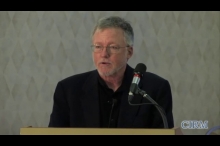

Greg Wasson is being honored as a Champion of Change in the Fight Against Parkinson's Disease.
Twenty years ago, when I was diagnosed, Parkinson’s was a movement disorder, period. The trope was “Alzheimer’s disease takes your mind but leaves your body intact; Parkinson’s takes your body but leaves your mind intact.” It was neat, easy to remember, and wrong.
Essentially no patients participated in decisions that shaped the funding, research, clinical protocols, and other factors that went into finding better treatments for PD. Patients were the passive recipients of experimental treatments, their reactions assessed to determine whether the treatment met statistical endpoints for improved motor control. Patients were talking monkeys, with their advantages and disadvantages: disadvantages - they liked to talk, couldn’t be kept in cages, and couldn’t be intentionally sacrificed for data retrieval; advantages - they were plentiful and cheaper than monkeys, didn’t require cages and food, and they were the target population, making data assessment more direct.
Much of the credit for the current view of PD as a multi-faceted disease, including cognitive and sensory components, belongs to those talking monkeys who refused to stop talking, and the researchers who realized that to dismiss evidence that did not fit the prevailing clinical paradigm was unsound science. The story of the progress in understanding PD is due in part to the strategic partnerships developed between the scientific and patient communities.
My involvement in what became the Parkinson’s patient advocate movement began as a member of an online bulletin board for PD patients in the late 1990s. There, patients compared notes and found shared symptoms that could not be explained under traditional PD models. The monkeys had begun to think outside the cage, rattling the bars and demanding to be heard.
During this time I also started volunteering with the Parkinson’s Action Network (PAN), which is devoted to advocating for the Parkinson’s community in the federal government. When my involvement in organizing an online petition to the White House on stem cells was noticed, PAN asked me to submit a proposal for a grassroots network advocacy program. The proposal was accepted, and my wife Ann (who also has Parkinson’s) and I were given a grant to travel across the country to recruit patients and their loved ones for the program. We traveled constantly for two years to promote the program, finding hundreds and eventually thousands of ordinary folks willing to play a part in making the voice of the patient heard in Congress.
The contacts Ann and I made during the Grassroots Network recruiting campaign led to our participation in other significant efforts. We testified before the California Legislature to enact the first laws to legalize research utilizing embryonic stem cells. We also helped pass Proposition 71 allocating $3 billion for stem cell research in California.
As other opportunities came along to give a patient perspective, Ann and I rarely said no. We joined up with other grassroots patient advocates to be heard on issues that patients were considered too “naïve” to know had already been settled by science. Cognitive loss, depression, pre-symptomatic olfactory loss, gastrointestinal issues, were raised again and again, and now sympathetic scientists were listening and confirming these concerns with new research.
Today, patient advisory councils, patients on IRB’s, and grassroots patient members of the boards of directors of national Parkinson’s organizations are accepted as routine and necessary. Most patients cannot engage in arcane issues of PD biochemistry. But we are smart people, and we can tell scientists things that they otherwise might never know - like when they stopped being able to smell the roses in their gardens.
Greg Wasson has been an active member of the Parkinson’s community for over 15 years, largely as an advocate with the Parkinson's Action Network (PAN)


